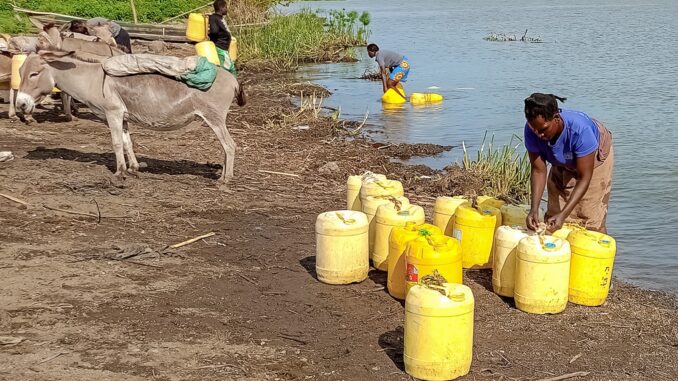
By Thuku Kariuki
When Odak Onyango and Vallery Adhiambo were growing up along the shores of Lake Victoria in western Kenya, clean water was abundant and not something people were concerned about.
“We grew up at a time when this water was not a problem in terms of quality. There were not so many agricultural activities and microplastics,” said Onyango, a local entrepreneur who has turned the growing problem of contaminated water into an opportunity – thanks to a unique and locally applicable solution.
Onyango has a master’s degree in community arts and also studied entrepreneurship at Utrecht University in the Netherlands. He received water purification and filtration training from Aquablu, a Netherlands-based start-up credited with making canal water in Amsterdam canals safe for drinking.
“Today what we get, in terms of microplastic per week, is unbelievable,” he said of the water in Lake Victoria; a situation that prompted him to partner with Adhiambo, a 28-year-old with a background in environmental science and an undergraduate degree that saw her focus on water sustainability in rural areas.
Onyango and Adhiambo are the founders of MSafi, which describes itself as a “smart water ATM”. Their system draws dirty water directly from the lake, or from a borehole, using a pump powered by solar. Water is piped into tanks, where the purification process starts.
“So, what we do is, first of all, pre-filter this water. We remove the hard metals, like, really, iron. We let them sink in the tank. That will yield some purification. After that, we do pre-filtration, and then we do active carbon, which removes all the smell and colour. We then use reverse osmosis, or we can use ultra-filtration and then we use UV lamps for ultraviolet rays. That means you don’t need firewood to heat the water again,” Onyango said.
Homabay County, where the project is situated, has 146 beaches and the organisation plans to open clean water points in each one of them, through a partnership with the county government. Already operating in two locations and preparing two more, their vision is to scale 50 in the next year.
The tanks located at the beaches offer safe drinking water to communities situated nearby.
“When we came here, we saw a problem because most women engage in business, and they have children to take care of. When you looked at the distances that they were walking just to get this clean drinking water, it was very far… For some women, that was a task and they would end up just having this lake water directly to drink, like that,” Adhiambo shared.
Adhiambo noted that drinking dirty lake water exposed the community to a lot of waterborne diseases.
“We would get a lot of diseases coming up from this area because we’d get like 50 people admitted for cholera, you’d get outbreaks and you’d get all these waterborne diseases affecting them. So, we said this area needs an intervention and we have the intervention,” she said.
Their ‘water ATM’ water purification point has an integrated payment system that offers unique personal identification numbers (PINs), enabling customers to register and use the system without having to wait for an attendant.
Residents pay 3 shillings (about 2 US cents) per 20 litres of pre-filtered water and 40 shillings (about 27 US cents) for 20 litres of mineral water.
The duo’s initiative, which operates as a startup, Wable Maji Safi Solutions, is now helping fishing communities around the lake. Both fishermen and fishmongers from the area are getting more time to spend on their jobs instead of long searches for clean water.
Oluoch Adero is a fisherman operating from the beach at Lwanda-Nyamasare. After spending many hours trying his luck fishing in the lake, he would be left with no time to look for clean drinking water – resulting in him and his family consuming contaminated water from the lake.
“We have a hospital here called Nyia which used to be frequently crowded with people complaining of stomach complications like diarrhoea, and stomach ache but nowadays we don’t have such cases,” Adero said.
According to Adhiambo, Wable Maji Safi has its water tested regularly by a relevant water quality laboratory.
“Our tests were done by the county government of Homabay in the water quality laboratory in Kisumu. We have in place where the water quality assurance is done by them, we monitor it very closely,” Adhiambo said.
Lucy Achieng, a fishmonger, is another beneficiary. She lives a few meters from the water point, making it hugely convenient for her to obtain fresh water. Achieng previously operated a small hotel by the beachside but now owns a fish business.
“I have shifted to the fish business and the water also helps me at home with my family. My fish customers appreciate clean drinking water. so I want to thank Wable for giving us clean water for the past 2 years,” she said.
Achieng wants the organisation to expand their project and benefit other communities the same way they have benefited hers.
“They should continue helping other communities get clean water. Now we have access to clean water and there are no diseases. For me, I just want to say thank you very much,” she said.
Distributed by bird story agency
